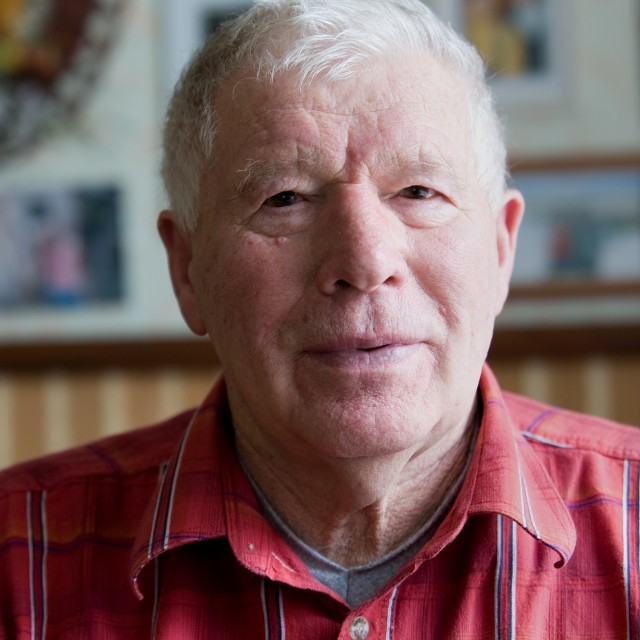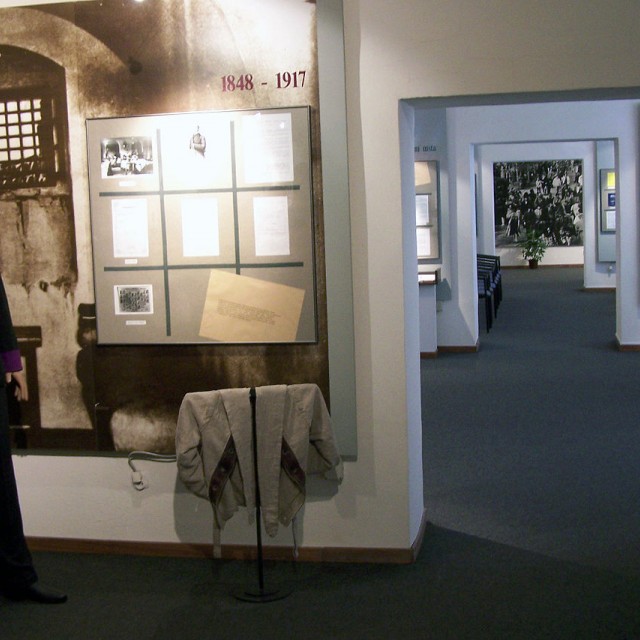Sharing a cell with a lunatic
Vladimír Ponikelský was arrested in the year 1949 and was charged in a fabricated lawsuit with omitting to report a criminal act. He had to share his interrogation cell in Pankrác with a man who was either completely mad or managed to successfully feign madness; until today he is not sure of the truth. “For example he had visitors who had brought him clean clothes. He took a shirt and shred it into pieces. Or we got some soup and instead of eating it, he bathed in it,” he recalled. The prisoners had a pole in their cells which was used to close the windows for the night, which were too high to reach: “One night I woke up and I saw him standing above me with the metal pole. I asked: ‘What’s wrong?’ He said: ‘That tiger over there, can you see that tiger in the corner?!’ So I told him: ‘Hey, give me the pole and we’ll get rid of the tiger somehow.’ And I put the pole under my straw mattress. Then I told the warden: ‘Sir, I’ll do anything you’ll want me to, I’ll clean the handrails in the corridors, just set me free from that lunatic.’” Mr. Ponikelský was set free from the cell by a trial, which had, however, sent him for almost a year to the uranium mines in Jáchymov.
Hodnocení
Abyste mohli hodnotit musíte se přihlásit!
Trasy
Příběh není součastí žádné trasy.
Komentáře

Vladimír Ponikelský
Vladimír Ponikelský, retired captain, born on 10 November 1923, is not only a witness but also an active participant of the battles fought by the First Czechoslovakian Army Corps. He entered the forces in Rovno in Volhynia in March 1944 and thus he was one of 12,000 volunteers who entered the Czech army on the east front. His father Václav, brother Rostislav and uncle joined the army together with him. His sister and stepmother stayed on a family farm in Máslenka, which is a village near Dubno where the family was from and where Václav Ponikelský was a mayor. Originally, it was Vladimír Ponikelský's great-grandfather who arrived in Volhynia; his father Václav was born there. The family had a small farm in Máslenka and they even entered the Orthodox church. It was usual then for the Czechs to speak more languages in Volhynia because the area was multinational. There lived the Polish, Ukrainians, Jews, Germans, and Czechs. The national ambitions of the Ukrainians became a threat to vital interest of other nationalities which were threatened also by the advance of the German army that came to Ukraine in 1941. So in 1944 Volhynia was an area where there had been several waves of violence - committed by the Germans and Ukrainian nationalists. But the Soviet Bolsheviks were becoming the major force. Vladimír Ponikelský served in artillery units and was trained in Romania for several weeks. He first participated in real fights during the Battle of the Dukla Pass - first near Krosno, Jaslo and Machnowka near Dukla and then in the pass which was infamous for the great losses that Czechoslovak troops suffered. Finally, in May 1945 he and his unit arrived in Prague. At that time he knew that his brother Rostislav had died during the Battle of the Opava nad Ostrava because his tank was hit by a mine. Also his uncle was shot dead by the Germans - it was during the Battle of the Dukla pass when he was in the kitchen. Vladimír Ponikelský and his father decided to stay in Czechoslovakia for good. They settled down in Levonice u Postoloprt where they received a small field with the area of 12 hectares and they started a farm. So Vladimír Ponikelský had to leave the army because of his father, even though he could expect a promising career there. He, like many Czechs from Volhynia who fought on the eastern front, did not want to go back there - the Soviet communists were not preparing a good future for Volhynia. However, the communist did not prepare a good future for him in his new home. He was arrested in 1949 because he did not report a crime. He did not report a friend of his to the police, who, according to the court, committed high treason. During the trial forty people were sued and Vladimír Ponikelský was sent to prison for 10 months. However, before that he had been tortured by secret policemen in Most during several-month investigation. He served the rest of his punishment in uranium mines in Jáchymov. After he had left prison he was offered to cooperate with the police several times. Nevertheless, Vladimír Ponikelský refused that and he did not even join the communist party, although it would have been beneficial for him as a former farmer, now the worker of a cooperative.







